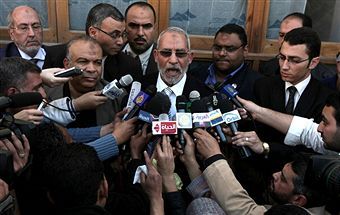 Back in Cairo, I try to find answers to what everyone wants to know. Who are the Muslim
Brotherhood? What role will the Muslim Brotherhood play in the future? Even to seasoned observers it seems hard to divine. Their support in the country has never been tested and the constitutional
referendum, where the brotherhood was on the winning side, is a poor proxy.
Back in Cairo, I try to find answers to what everyone wants to know. Who are the Muslim
Brotherhood? What role will the Muslim Brotherhood play in the future? Even to seasoned observers it seems hard to divine. Their support in the country has never been tested and the constitutional
referendum, where the brotherhood was on the winning side, is a poor proxy.
What is clear, however, is that they have the organisational muscle the post-Tahrir Square parties lack. And that they are willing to play a long game, rejecting a shot at the presidency for example for fear of a backlash against them. Though some members talk of Turkey’s AKP as a model for the brotherhood, they are desperate to avoid the fate of Algeria’s Islamists who won an election in the 1990s that was annulled. So they are proceeding cautiously and cleverly.
The movement is also not the cohesive force many assume it to be. In the parliamentary elections there will not be one Muslim Brotherhood party, but several. Some are more hard-line, others more liberal. The youth wing includes Gucci scarf-wearing girls, who meet you in trendy Cairo coffeeshops and want the Brotherhood to allow women and Copts to stand for the party’s presidency. Early elections may encourage these fissures as much as it will play to the brotherhood’s organisational strength.
Then there is the question of what the brotherhood stands for in non-traditional areas. What, for example, is their economic outlook. To my surprise, I find they are seen as “neo-liberal” with many millionaire businessmen as members. Islamic Calvinists, an analyst suggests, which seems a little too naïve to me.
Most surprising, though, is the unholy alliance emerging between the military, the Brotherhood and the remnants of NDP, Hosni Mubarak’s party. Sworn enemies for so long, they have now found common cause in pushing for early elections and marginalising the new parties. But fights over the power of parliament and the presidency will make this new coalition an unwieldy one. So will arguments over Islam’s role in Egyptian society, as detailed in the new constitutional amendments just agreed.
To repeat a metaphor I’ve heard here a couple of times, it is as if the revolution has switched on the light in a once-dark room allowing all the factions of Egyptian society to see each other for the first time. But it is also allowing the Muslim Brotherhood to see itself in full.






Comments